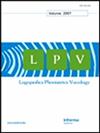瑞典发展性语言障碍儿童阅读解码技能的描述与预测。
IF 0.7
4区 医学
Q4 AUDIOLOGY & SPEECH-LANGUAGE PATHOLOGY
Logopedics Phoniatrics Vocology
Pub Date : 2022-07-01
Epub Date: 2020-11-03
DOI:10.1080/14015439.2020.1839964
引用次数: 4
摘要
目的:在瑞典语发育性语言障碍儿童的临床样本中,缺乏阅读解码技能的研究。方法:本横断面研究包括61名8-12岁的DLD儿童,在学校语言单位就读,1至5年级。我们的目的是研究阅读解码技能和解码的预测因素,如语音处理技能(非单词重复)、工作记忆和读写问题的家族史。结果:单词和非单词解码的综合测量结果表明,只有18%的儿童具有与年龄相称的解码技能。适龄解码器的比例随学年没有明显变化。随着学习年限的增加,参与者的解码能力与测试标准的偏差也越来越大。分层回归分析显示,解码技能的最佳预测指标是工作记忆和非单词重复,其次是学年。这些因素显著地促成了我们的DLD患儿样本中解码的差异。识字问题的家族史对差异没有贡献。结论:研究结果强调了评估和跟踪DLD儿童读写能力发展的必要性。本文章由计算机程序翻译,如有差异,请以英文原文为准。
Description and prediction of reading decoding skills in Swedish children with Developmental Language Disorder.
Abstract Aim Research is lacking in terms of reading decoding skills among clinical samples of Swedish-speaking children with Developmental Language Disorder (DLD). Method The present cross-sectional study included a sample of 61 children (8-12 years) with DLD attending school language units, years 1 to 5. Our purpose was to study reading decoding skills and predictors for decoding, such as a phonological processing skill (nonword repetition), working memory, and a family history of literacy problems. Results The results on a combined measure of the word and nonword decoding indicated that only 18% of the children had age-adequate decoding skills. The proportion of age-adequate decoders did not change noticeably with the school year. The participants’ decoding skills showed larger deviations to test norm means with higher school years. Hierarchical regression analysis showed that the best predictors of decoding skills were measures of working memory and nonword repetition, followed by school year. These factors significantly contributed to the variance in decoding among our sample of children with DLD. A family history of literacy problems made no contribution to the variance. Conclusions: The findings emphasize the necessity of assessing and following up on literacy development in children with DLD.
求助全文
通过发布文献求助,成功后即可免费获取论文全文。
去求助
来源期刊

Logopedics Phoniatrics Vocology
医学-耳鼻喉科学
CiteScore
2.50
自引率
9.10%
发文量
21
审稿时长
>12 weeks
期刊介绍:
Logopedics Phoniatrics Vocology is an amalgamation of the former journals Scandinavian Journal of Logopedics & Phoniatrics and VOICE.
The intention is to cover topics related to speech, language and voice pathology as well as normal voice function in its different aspects. The Journal covers a wide range of topics, including:
Phonation and laryngeal physiology
Speech and language development
Voice disorders
Clinical measurements of speech, language and voice
Professional voice including singing
Bilingualism
Cleft lip and palate
Dyslexia
Fluency disorders
Neurolinguistics and psycholinguistics
Aphasia
Motor speech disorders
Voice rehabilitation of laryngectomees
Augmentative and alternative communication
Acoustics
Dysphagia
Publications may have the form of original articles, i.e. theoretical or methodological studies or empirical reports, of reviews of books and dissertations, as well as of short reports, of minor or ongoing studies or short notes, commenting on earlier published material. Submitted papers will be evaluated by referees with relevant expertise.
 求助内容:
求助内容: 应助结果提醒方式:
应助结果提醒方式:


